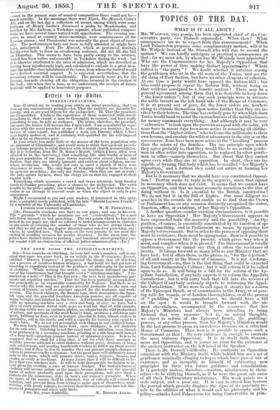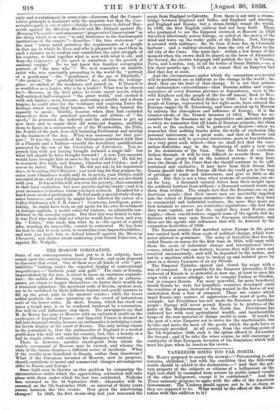TOPICS OF THE DAY.
WHAT IS IT ALL ABOUT ?
ME. WALPOLE says gossip, has been appointed chief of the Con- servative party, vice Disraeli superseded. What then ? What consequences are we to expect from this announcement ? When. Lord Palmerston proposes some complimentary motion, will it be Mr. Walpole instead of Mr. Disraeli who will rise to second the motion ? We can hardly anticipate so practical a consequence as that ; for we must ask, by whom has Mr. Walpole been appointed? Who are the Commissioners for her Majesty's Opposition that have the power of thus making distinct appointments ? Where indeed is "the party " ? We doubt whether it survives among the gentlemen who sit in the old seats of the Tories, and use the old slang of Tory faction, but have no other elements of cohesion. At one time a party would have opposed the Reform Bill ; but who could propose to repeal the Reform Bill, without being on that evidence consigned to a lunatic asylum ? There may be a general agreement among them that it is desirable to keep down ME. WALPOLE says gossip, has been appointed chief of the Con- servative party, vice Disraeli superseded. What then ? What consequences are we to expect from this announcement ? When. Lord Palmerston proposes some complimentary motion, will it be Mr. Walpole instead of Mr. Disraeli who will rise to second the motion ? We can hardly anticipate so practical a consequence as that ; for we must ask, by whom has Mr. Walpole been appointed? Who are the Commissioners for her Majesty's Opposition that have the power of thus making distinct appointments ? Where indeed is "the party " ? We doubt whether it survives among the gentlemen who sit in the old seats of the Tories, and use the old slang of Tory faction, but have no other elements of cohesion. At one time a party would have opposed the Reform Bill ; but who could propose to repeal the Reform Bill, without being on that evidence consigned to a lunatic asylum ? There may be a general agreement among them that it is desirable to keep down the lower orders "; but if any such principle were to animate the noble breasts on the left hand side of the House of Commons, it is at present out of gear, for the lower orders are nowhere rising to obtrude themselves upon notice further than they are in vited bytheir betters. The tune has entirelygone by when high-born Tories would band to resist the encroachments of the middle classes; for money commands everything. And although it may be very " subversive " to look upon the parvenu as equal with the noble yet none have in recent days been more active in removing all distinc- tions than the "higher orders," who welcome the millionaire to their own bosoms, and emulate the wildest adventurer in the city or on the race-course. None have been more active at the " levelling ' process than the scions of the families. The one principle upon which they agree probably is' o that they would like to see certain gentle- men in office retire into opposition, to be replaced by other gentle- men in office—namely themselves. But about that they cannot agree even while they are in opposition. In short, they are in- capable of forming, that body which has been called" her Majesty's Opposition," and a. fortiori they could not arrive at forming her Majesty's Government.
But is it necessary that we should have any constituted Opposi- tion? Destiny seems to reply in the negative, since that cannot be necessary which does not exist. It seems that we cannot have an Opposition, and that we must reconcile ourselves to the idea of doing without it. Is it essential to the British constitution? We do not find it in the Bill of Rights. Our most diligent re- searches in the records do not enable us to find that the Crown or Parliament has on any occasion distinctly recognized the status, function, office, or existence, of her Majesty's Opposition.
A further question—under existing circumstances, is it possible to have an Opposition ? Her Majesty's Government appears to have superseded both the necessity and the possibility. An Op- position, of course, is essentially constituted by its function of op- posing something, and in Parliament we mean, by opposing her Majesty's Government. But in order to the process of opposing there must be resistance, there must be oppugnance. How is it possible to oppose a Government like the present, which gives way when it must, and complies when it is pressed ? The Government is totally unobtrusive, yet we cannot say that it offers the resistance of inertia. It brings forward as many bills as any Ministry that we have had ; but it offers them, as the phrase is, "for the rejection" of all and sundry in the House of Commons. It is not a reform- ing Government—no that is the last thing that could be expected from Lord Palmerston's Cabinet ; but it will reform if it be called upon to do so. It will bring in a bill for the reform of the Ap- pellate Jurisdiction, if anybody expects it to reform the Appellate Jurisdiction ; but it will carry back that bill into the recesses of the Cabinet if anybody seriously objects to reforming the Appel- late Jurisdiction. If we were to call upon it stoutly for a reform of the Episcopal Bench, or of commissions in the Army, or of pass- ing tolls for vessels, or of London thoroughfares, or of the process of " puddling " in iron-manufactures, we should have a bill on the spot : it would be brought forward with the ut- most cheerfulness, accompanied by the assurance that her Majesty's Ministers had always been intending to bring forward that very measure : 'but if, on second thoughts, we object to reform of the Episcopal Bench, the puddling- process, or any other process, then her Majesty's Ministers would be the last ptrsons to press an unwelcome measure on a reluctant House of Commons. Then how is it possible to oppose such a Government as that ? Its very existence is enough to enervate the most virtuous Opposition. It is in itself both Govern- ment and Opposition, and it leaves no room for the existence of the ancient institution on the left hand of the Speaker.
There is Mr. Disraeli's difficulty. He confronts an Opposition coincident with the Ministry itself, while behind him are a set of gentlemen nominally clinging to hopes which have passed out of existence, and as incapable as himself of extricating new principles for their own future guidance and consolidation. It is perfectly useless, therefore—wanton, mischievous to them- selves—to be vilifying Disraeli, as if he were the great sole cause of all their Parliamentary misfortunes. His weak points are a stale subject, and a poor one. It is easy to attack him because the journal which proudly displays the signs of its paternity re- vels in the oddities of what it would call his philosophy and his policy—attacks Lord Palmerston for being Conservative in prin-
ciple and revolutionary in connexion—discovers that the Conser- vative principle is dominant with the majority but that the Con- servative party is out of place—thinks it necessary to defend May- nooth against the Morning Herald and Mr. Disraeli against the Morning Chronicle—and announces "progressive Conservatism" as the thing which is at once "to add buttresses to the .fundamental institutions of the empire "—describes "the true statesman" as the man "whose mind perceives the requirements of a people in that age in which he lives, and who is prepared to meet them in such a manner as to confirm and consolidate the solid strength of his country, to bind together what is new with what is old and from the exigencies of his epoch to contribute to the growth of national empire." Do we not know this familiar autographic portrait of "the man who " ? We well remember an amiable artist who was constantly presenting to the world the "portrait of a gentleman "—the gentleman of the age of Elizabeth,"
"the i
painter," the "grateful father," &c., all from the looking- glass : we smiled at the weakness, and passed on. If Disraeli s so worthless as a leader, why is he a leader ? What was he chosen for P—Because, in the first place, he wrote smart novels, which half-satirized half-eulogized "the great world," and excited it 'with safe banter; next, because, possessing a nimble and a sharp tongue, he could utter for the residuary and expiring Tories the feelings which wrung their bosoms, but which they wanted the capacity to speak ; thirdly, because when they had excluded themselves from the practical questions and actions of "the epoch," he possessed the industry and the adroitness to get up new facts and to repair their old worn-out dogmas, enabling them to figure in a masquerade as if the Wentworths, the Pitts, the Norths of the past, were still haunting Parliament and mixing in the business of the day. What was necessary for that pur- pose It was the research of the litterateur combined with that of a Planche and a Nathan—exactly the hereditary qualifications possessed by the son of the Curiosities of Literature. You re- proach him with not having brought forward a single bill : but what bill should he have brought forward ? A true Tory measure would have brought him at once to the test of defeat. He did try to reconcile free trade and finance, Chandos and Cobden ; and of course he failed. What then ? lie did not ask, in his ingenuous days, to be acting chief Minister: you used him for that purpose be- cause your Chandoses woulch only do in novels, your Derbys could not stand alone, and your Pakingtons could sit but not act nor think -with you. It was not his will, nor even his poverty, that consented to that fatal exaltation, but your poverty and his vanity ; and it is your meanness to traduce whom you have seduced. He asked for a much more modest preferment. He had made a special study of con- sular business ; and surely he might have followed the career of a Colley Grattan or a G. P. R. James? Courteous, intelligent, pains- taking, he could have been an apt agent for his own Government in foreign capitals, a model usher for visitors' an admirable con- tributor to the consular reports. But that fate was denied to him : it was Peel who made him not what he would have been, and you
the "Tories," is —the who made him what he —the agent of a part;
who wanting the impossible, cannot be contented. He has 'lone his best to sink to your level, to neutralize your impracticabilities;
and now you leave him to defend himself against the Morning Chronicle, and chatter about cashiering your Grand Palaverer, to appoint Mr. Walpole.



























 Previous page
Previous page